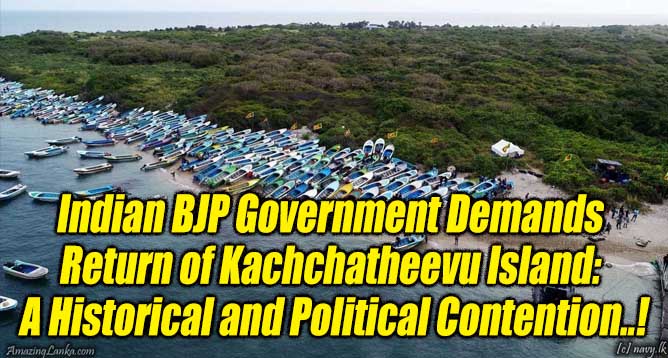-By A Special Correspondent

(Lanka-e-News -27.March.2024, 9.25 AM) The demand for the return of Kachchatheevu Island by the Indian BJP government has sparked renewed debates and controversies surrounding the sovereignty of this uninhabited landmass situated in the Palk Strait between India and Sri Lanka. The recent discourse led by Tamil Nadu BJP chief K Annamalai, in consultation with the BJP leadership, underscores India's historical claim to the island and challenges the legitimacy of the 1974 agreement that purportedly ceded it to Sri Lanka.
The claim that the BJP government is coercing Sri Lankan President Ranil Wickremesinghe to hand over Kachchatheevu Island in exchange for financial assistance requires careful examination. Here's a nuanced analysis of the situation
1-Historical Context: Kachchatheevu, also known as Kachchathiva or Katchatheevu, holds significance dating back to the colonial era when it was administered jointly by British India and Ceylon. However, with India's recognition of Sri Lankan ownership in 1974, based on a conditional agreement, the dispute over the island's sovereignty intensified.
2-Legal Challenge: The BJP leadership argues that the 1974 agreement did not adequately address India's sovereignty over Kachchatheevu, citing historical documents and constitutional lapses. They contend that the agreement, lacking ratification by the Indian Parliament, is legally questionable and does not settle the island's status definitively.
3-Tamil Nadu's Concerns: Tamil Nadu, historically connected to Kachchatheevu due to its proximity and cultural ties, has raised objections to the transfer of the island's ownership. Past petitions filed by Tamil Nadu governments, including the recent one in 2011, sought to declare the 1974 agreement unconstitutional, reflecting the state's persistent opposition.
4-Religious Significance: The presence of St. Anthony's Catholic Shrine on Kachchatheevu adds another layer of complexity to the dispute. The shrine, revered by both Indian and Sri Lankan Catholics, symbolizes the religious and cultural heritage shared by the two nations.
5-Economic and Strategic Motivations: Beyond historical and cultural considerations, geopolitical interests and economic incentives play a role in the demand for Kachchatheevu's return. With India's substantial financial assistance to Sri Lanka, questions arise about potential leverage exerted by India to reclaim the island.
6-International Implications: The unresolved dispute over Kachchatheevu reverberates beyond bilateral relations, impacting India-Sri Lanka ties and maritime boundaries in the region. Any resolution will require delicate diplomacy and adherence to legal frameworks.
7-Contemporary Dynamics: The demand for Kachchatheevu's return intersects with broader geopolitical shifts and domestic politics in both India and Sri Lanka, shaping the trajectory of negotiations and public discourse.
8-Economic Assistance vs. Territorial Claims: While it's true that India has provided significant financial aid to Sri Lanka during periods of economic instability, attributing this assistance solely to territorial gains oversimplifies the complex dynamics of bilateral relations. Economic aid is often provided based on mutual agreements, economic cooperation, and regional stability concerns, rather than as a quid pro quo for territorial concessions.
9-Legal and Diplomatic Frameworks: International law governs territorial disputes, and any attempt to alter sovereign boundaries requires adherence to legal processes and diplomatic negotiations. Accusations of coercion or betrayal of sovereignty should be substantiated with concrete evidence of diplomatic pressure or violation of international norms.
10-Historical Context: References to past agreements, such as the Indo-Lanka Accord of 1987, provide context but do not directly correlate with current developments. Each territorial dispute has unique historical, legal, and geopolitical factors that shape the negotiations and outcomes.
11-Sri Lankan Sovereignty: Sri Lanka's sovereignty over its territory, including Kachchatheevu, is a fundamental aspect of its national identity and international standing. Any decision regarding territorial matters would be subject to rigorous scrutiny within Sri Lanka's political and legal frameworks, involving multiple stakeholders beyond the president's authority alone.
12-International Intervention: Allegations of India using military force or undue influence to change Sri Lanka's constitution are serious and require substantiation. Any such actions would have profound implications for regional stability and would likely draw condemnation from the international community.
While the relationship between economic assistance and territorial disputes is complex, assertions of coercion or betrayal of sovereignty require robust evidence and careful consideration of legal, diplomatic, and historical contexts. It's essential to engage in constructive dialogue and adhere to established frameworks to address territorial disputes and promote peaceful resolution within the bounds of international law.
The BJP government's stance on reclaiming Kachchatheevu Island reflects a nuanced interplay of historical grievances, legal contentions, and geopolitical considerations. As the debate unfolds, it underscores the complexity of border disputes in South Asia and the imperative of diplomatic dialogue to achieve a mutually acceptable resolution.
---------------------------
by (2024-03-27 04:06:19)
Leave a Reply